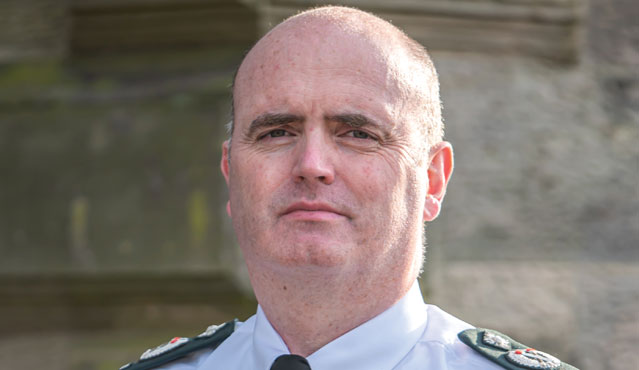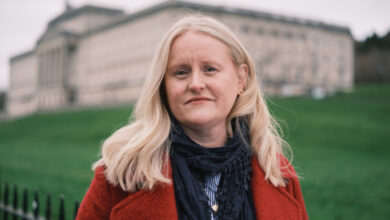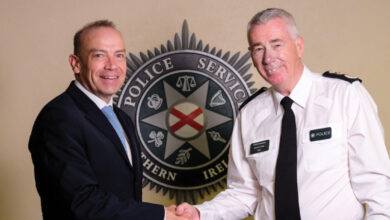Policing in a pandemic

PSNI Deputy Chief Constable Mark Hamilton talks to David Whelan about the budgetary pressures facing policing, the impact of the pandemic on resources and the forced acceleration of digital progress in response to Covid-19.
Describing the 2021/22 budgetary outcome for the PSNI as a “flatline budget”, Hamilton says: “That means we get exactly the same as we got last year. The problem with that is that it doesn’t factor for pay inflation and other types of inflation. In real terms that means there is a hole in the budget of around £23 million, which equates to around 300 officer posts.”
With Brexit funding for the PSNI yet to be secured in its entirety, falling around £5 million short according to the Deputy Chief Constable, Hamilton says that the hole created in the PSNI’s budget means that rather than ambitions and efforts to grow the organisation this year, numbers may have to “drift back”.
Pointing to a “nearly one quarter of one billion pounds in cuts” over the last decade for the PSNI, which Hamilton highlights as disproportionate compared to any other UK police force, the Deputy Chief Constable says that funding on an annual basis has proved a challenge.
The PSNI has not had a multi-annual budget for almost a decade and the Deputy Chief Constable summarises: “When funded from year to year, it’s very difficult. It forces you into short-term thinking on an annual basis and that’s really problematic for us.”
Budgetary pressures for the PSNI existed before Covid-19 but the organisation’s operational response to the pandemic has intensified that pressure. Discussing the impact of the pandemic on the PSNI operationally, Hamilton explains that while early predictions for a 30 per cent rolling absence rate did not manifest, the PSNI did have to adjust to deal with an 18 per cent absence rate at peak.
“Early on we focused on a contingency plan that would answer calls for service, particularly 999 calls, but thankfully we never had to invoke that plan. We also put all of our frontline officers on 12-hour shifts for a number of months and that allowed us to have sufficient resources on the ground,” says Hamilton.
Highlighting how these adjustments meant further financial pressures, Hamilton says: “The thing that has been most hard to manage has been the overtime budget. [The budget] is bid for and allocated upon a number of assumptions for the year and very few of those assumptions actually occurred.”
Asked whether the operational pressures had an impact on the PSNI’s ability to meet demand, the Deputy Chief Constable responds: “The worst-case scenario around resourcing never actually happened but what we did have was individual cases where we had to close stations or stand down entire teams but we never really saw any kind of drop off in our ability to meet demand,” he explains.
One advantage the PSNI has had in minimising disruption is the development of their own contact and trace system inside the service. Hamilton says that vigorous implementation has meant that disruption has not lasted long in any area of business.
Adaptation
Discussing the adaptations implemented by the organisation, Hamilton explains that the procurement of 1,000 laptops to facilitate remote working pre-Covid was doubled and a business model was very quickly created to allow those in the organisation who are not primarily frontline to work from home.
Describing how the pandemic has helped accelerate progress, through necessity, in some areas, he adds: “Things that would have taken us one year to pilot and one year to policy up we did in around two weeks. I think across many sectors, there is a realisation that your business models can be done in a different way if you want them to and we’re no different to that.”
“Things that would have taken us one year to pilot and one year to policy up we did in around two weeks. I think across many sectors, there is a realisation that your business models can be done in a different way if you want them to and we’re no different to that.”
The Deputy Chief Constable flags an interesting recognition that the shift to home-working for non-frontline staff has seen “quite considerable” drop offs in sickness rates and no recognised drop off in productivity. However, he explains that the ability to appropriately measure such statistics would have been ideally implemented in policy, had they not needed to be rolled out at speed.
Asked whether pandemic-related adaptations to flexible and home working are to be a permanent feature for the PSNI going forward, Hamilton says: “I hope so. I’ve always been an advocate of flexible working. We are quite a hierarchical organisation with multiple layers of supervision and rank structure but I’ve always been of the view that people should be able to do their work wherever they need to, provided the work is done.”
Public confidence
Another challenge facing the PSNI in the unique context of Covid has been around maintaining public confidence while also enforcing changing and evolving restrictions. A number of high-profile incidents have brought criticisms of the PSNI’s approach, not least their handling of the Black Lives Matter Protest in June 2020, with the Police Ombudsman reporting severe damage to confidence in policing among some within the black, Asian and minority ethnic communities in Northern Ireland and describing claims that the handling of the protest compared to a counter demonstration amounted to “unfairness and discrimination” as justified.
Asked to describe how challenging policing the Executive’s pandemic restrictions has been for the organisation, Hamilton highlights that level of regulatory change is without parallel in policing history.
“I don’t think anyone, in a stable situation, would have done it [introduce and amend regulations] in that way but things had to be done fast for various reasons. Fast law is difficult law and sometimes it’s not always the best law. I think the big test everyone had to apply and continues to apply for the coronavirus regulations is necessity and proportionality. Those tests are based in law but there is also a degree of subjectivity at times and not everyone agrees on what is necessary and what is proportionate. That puts policing in a really difficult spot.”
Hamilton believes that the enforcing of health regulations is something that most police officers and most legislators never really conceived and this has led to a trying and testing time for the community and “an unparalleled time of challenge for policing”.
Asked whether he believes the public are understanding of the challenge faced by policing, Hamilton adds: “I think we risk trying to think of the public as a single thought process. I think the view on regulations and enforcement varies and there is no single narrative around this.
“I do think that sometimes because of the history of policing in Northern Ireland and the history of challenging people’s behaviours, there has been a reluctance to do any of this without the police. That has drawn us in to a lot of areas where we are uncomfortable and the nature of some of the issues that we have in our communities is that people feel that only the police can mount challenges to people’s behaviour.
“I think it’s an impossible question to answer and I think history will probably make its judgement on these things.”
Three planks
In March 2020, in an interview with agendaNI, Police Chief Constable Simon Byrne pointed to three key planks of change he envisaged for the PSNI in the form of an investment into more officers for neighbourhood policing; modernisation of the PSNI estate; and digital PSNI.
With officer investment “stuck in the funding envelope”, Hamilton points to progress in relation to the PSNI estate and digital. The PSNI have got approval to move from a strategic business case to an outline business case in both areas. Discussing the PSNI’s aspiration to rationalise the size of its estate in Belfast, the Deputy Chief Constable says that while work in this area is in its infancy, the PSNI will continue to develop on its plans.
However, it is in the area of digital where he believes most progress has been done. “Digital has gotten the most traction given the level of work we have had do over the year. The nice thing is that in moving so fast we have been able to prove and disprove some of the concepts,” explains Hamilton.
Pointing to the wider impact of digital progression for the organisation, he adds: “Some of the discussion around officer numbers also relates to alternative ways of working. Affordability for police staff numbers may also be connected to how much differently we can do our business and do it more cheaply. However, to do this we need both capital and revenue investment and we hope to continue to invest on revenue lines to create a more effective and efficient workforce.”
Hamilton acknowledges the financial constraints in which the Department of Justice and the Executive are also working on and outlines initial moves by the PSNI to recruit a strategic partner to aid with change and transformation issues.
Diversity
Another area marked out by Chief Constable Byrne for progress was the creation of a more diverse workforce. Latest workforce composition figures show no significant progress in increasing the number of officers in the PSNI who are Catholics (31.9 per cent), women (30 per cent) or from an ethnic minority background (0.58 per cent).
Acknowledging the figures, Hamilton says that there are few organisations in Northern Ireland “working as hard around its diversity demographic” as the PSNI.
“There is quite rightly a challenge laid down to us that if you police your communities well, make them open and accessible, with confidence levels in them, then you attract people to join,” he says.
Pointing to existing barriers to better diversity, including how the police are viewed in Northern Ireland’s society, he adds: “There is a massive responsibility on people like me to make sure the PSNI is an attractive place to come to work. We have seen really strong progress over the last 10 years, particularly in the area of female recruitment, but not so much in the minority ethnic community and the overall BAME community.
“I think there are a number of reasons for that. Part of it is that some of the newer communities… have issues with trust around policing, globally, not just in Northern Ireland. So, we’ve had to make up a lot of progress there. I wouldn’t deny that the issues that have arisen for the BAME community out of the Black Lives Matter report probably adds to levels of concern and mistrust.”
In relation to Catholic recruitment, Hamilton acknowledges that the progress following the Patten recommendations has slowed but says that the PSNI are developing strategies, processes and programmes annually to assist with this, as well as focusing on outreach for every recruitment programme.
He adds: “Objectively speaking, in many areas we have proven to have shown our bona fides but it still isn’t enough. There is a burgeoning issue for a number of years now for people, from whatever community they identify, around the process of getting into the police. There is a strong sense that the process favours the more well educated and primarily the middle classes of Northern Ireland. That is a challenge because of the competitive nature of applying for a job and finding a balance in a purely merit-based process which is open to everyone.”
Describing initiatives with neighbourhood policing, including volunteering schemes and police community support officers, as creations of potential entry points into the police, he adds: “It still remains a difficulty. Every time we open recruitment we get around 5,000 applications across the province. Quite rightly, jobs are allocated on a merit-based principle, which is entirely in line with the law but we haven’t came up with the solution to fully-balanced recruitment.”
Hamilton believes that the PSNI could be better assisted in relation to attracting a more diverse workforce and believes the settling of “environmental factors” including the PSNI’s requirement to “be in the legacy space”, would be a healthy factor for policing in Northern Ireland.
Outlook
Turning to the year ahead, Hamilton believes that the greatest challenge facing the PSNI will be the unknown of transitioning out of Covid. This, he states, relates not just to finances but also recognises trends in other countries where the ending of lockdown has coincided with a rise in reports of domestic abuse and sexual assault and he aims to make sure that the PSNI retains the confidence of victims to report crimes.
Equally he is aware of historic trends of rising inquisitive crime in times of higher levels of unemployment but maintains that his glass remains half full in terms of recovery.
“I think the community has shown its resilience over the last year. It has been horrific for people, particularly those who have lost loved ones but we’re coming through and I hope that a little bit of the good will that we had in pulling together at the start of all of this is retained.”
For the PSNI as an organisation, Hamilton describes a potential better budgetary process as an advantage but says that his main ambition for the year is to see policing “consolidate and improve” community sentiment.
“The purpose of what we do hasn’t changed and I’d like to see the PSNI as one of the organisations that helps lead our community out of the crisis because I think we possess a lot of skills and a lot of commitment. I’d like us to be a key part of the recovery,” he concludes.






